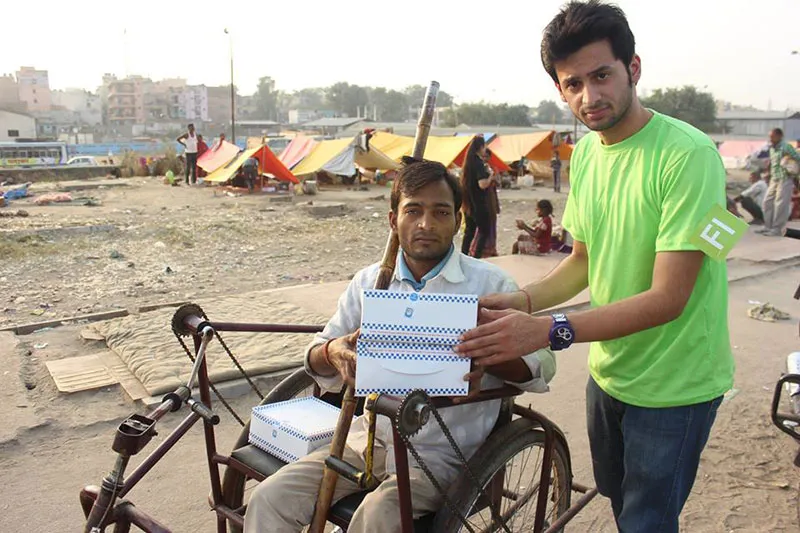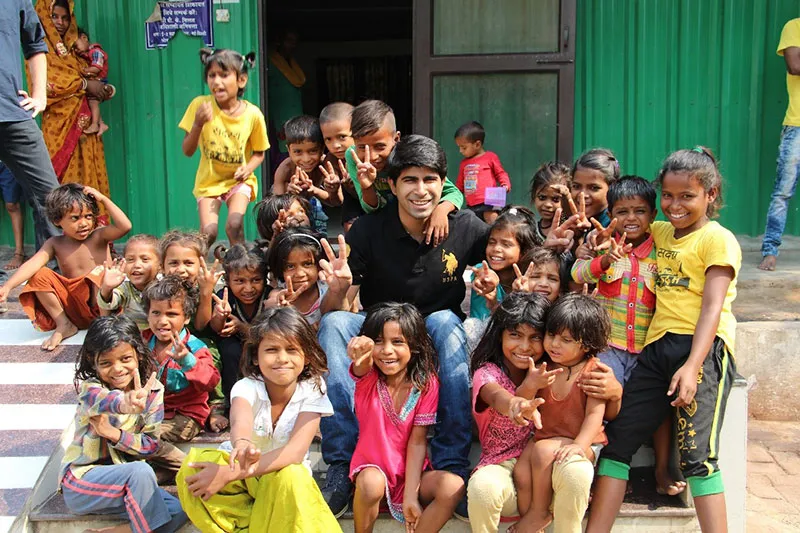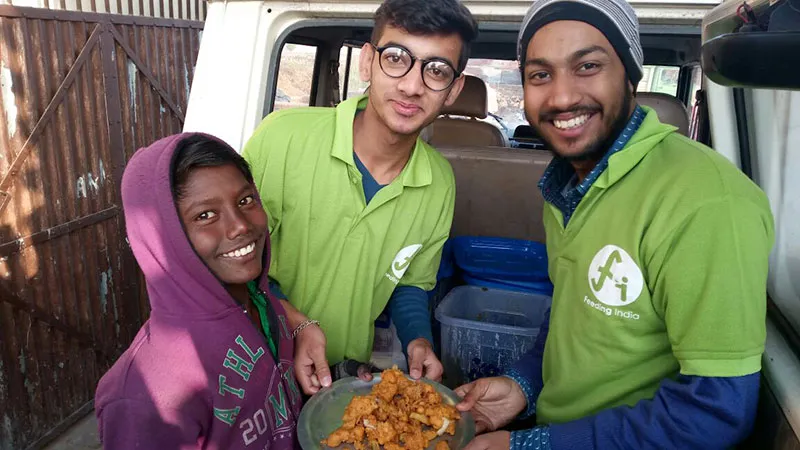This 70th Independence Day, Feeding India put an end to starvation in the lives of 71 slum kids
If you can't feed a hundred people, then feed just one, said Mother Teresa. This Independence Day, the power and opportunity to feed not just one but 71 underprivileged slum kids were given to us all.
Having raised close to 1.5 lakh through a #FreedomfromHunger crowdfunding campaign, Feeding India, a not-for-profit social enterprise, changed the lives of underserved children in Gurugram. By introducing to them the concept of daily meals, today, these kids no longer consider food a luxury.
With this, the growing nationwide organisation, to this day, continues to bridge the imbalance between half of those who do not have enough to eat and the rest that has too much.

Over nine million meals served till date
Quitting a lucrative job at a global firm while he was just 22 years old, Ankit Kawatra founded Feeding India in 2014. The epiphany to do so occurred while he was at a lavish wedding in Delhi, where 35 different cuisines on the menu got him thinking where the leftovers would end up.
After a conversation with the caterer, Ankit (25) was left shocked and dismayed. “I learnt that all the food would go nowhere but in the bin, what was even disturbing was the fact that this amount of food could've fed nearly 10,000 hungry stomachs,” says Ankit.
Wound up in the same thought for the next few days, Ankit realised that we lived in a country where hunger kills more people every year than AIDS, malaria and tuberculosis combined. Ironically, at the same time, 40 percent of food goes waste in India, food enough to feed a third of the poor. “Days passed as the thought of food going to waste in a country with the highest number of undernourished people around the world hung on to me and left me wondering why no one had stepped up to take action.” Determined to improvise this sad state, Ankit made the decision to start Feeding India.
“I found it unacceptable that there are millions of people who die not because they were unable to find a cure to a rare disease, but because they could not find a plate of proper nutritious food,” he adds. Pointed out as being a foolish to invest all his savings and sacrifice the comfort of his corporate life to join the social sector, Ankit did not give up and managed to urge five friends to join Feeding India in August 2014.

Starting out small, Feeding India today serves 8,00,000 meals to people in need every month. Sixty percent of this happens with the help of young volunteers. “These hunger heroes help us collect excess food from restaurants, weddings, parties and caterers and bring this food to those who have no access to food or cannot afford buying food,” Ankit explains.
This is carried out through several projects implemented all over the country eradicating hunger without a stop. In the past three years, Feeding India has worked with children, elderly and specially-abled in over 50 cities with a relentless team of 7,000 volunteers. Having partnered with nearly 2,000 shelter homes along with a 24/7 helpline, app and email that help people donate food, they have served over nine million meals to the hungry.
#FreedomfromHunger
“At Feeding India, we serve food to the people who really need it and have no means or access. We do not believe in a concept of replacing meals but to provide meals to children, elderly and specially-abled who otherwise would have gone hungry,” shares Srishti Jain (24), CMO of Feeding India.
With the aim to do the same this Independence Day, Feeding India launched a crowdfunding campaign to fill the tummies of 71 needy children from Krishna Basti School who suffer from no sickness, but, sadly, from basic hunger. This campaign was launched with a bigger picture in mind. Coming from the slums of Gurugram in Delhi, for most families, these children are bread-earners. They spend their days in garbage compounds collecting materials to sell and earn food.

Feeding India has set up many small-scale schools to encourage the parents to send their kids here instead of rag-picking by giving them nutritious food. As the kids do not get proper food (in enough quantity and nutrition) at home, this acts as a major motivation for the parents as well as the kids. Apart from the mass increase in nutrition levels, there is a direct increase in the attendance rate and performance of students in class. “Conservative parents of children open up to sending their children to schools eyeing the food being provided and soon understand the value of education coming along with it,” says Srishti.
With an 80-percent success, this campaign that raised Rs 1.5 lakhs today provides wholesome meals to the 71 children on a daily basis along with education.
Feeding India: a continuous process you can be part of
Evident from its name, Feeding India wants to create an unending cycle that puts hunger to an end. “I wish to achieve #ZeroHunger in my lifetime, I want to make hunger history,” says Ankit.
To turn this into a reality, this NGO has begun five major projects -- with the aim to help children focus on education by supporting small-scale schools that sustained feeding programmes, Feeding India provides grains or caters freshly prepared food to small-scale schools in need as part of their PoshanToPaathshala project. Their MagicTruck programme runs a 24x7 refrigerated vehicle that collects and donates excess food to the needy. The Hunger Hero Program has a growing movement of volunteers across different cities who help in donating excess food and partnering with relevant stakeholders. And, lastly, through their Disaster Relief and Awareness Campaigns, Feeding India provides food packets to disaster relief areas and spreads awareness about the cause of hunger and food waste.

Presently, through an ongoing crowdfunding campaign, Feeding India needs support to feed 300 children living in unhygienic conditions barely understanding the importance of proper nutrition. These slum kids from Bhavani Enclave School situated in a remote area of Gurugram are malnourished because of no proper meals at home. To most, school is the only relief during the day and their only access to education. The funds raised will help provide complete nutritious meals to each of these children on a daily basis thus improving their attention span at school.
Glad to have chosen this life-transforming path Ankit says, “If I have 30-50 years ahead of me in my lifetime, I would rather spend it applying my energy and skills to solve social problems and achieve something monumental for humanity, rather than follow the path that everyone expected me to. Even if it meant giving up on a few things, my early dreams and hopes, that would be too small a sacrifice as compared to what could be possibly achieved for people at large.”
With regular continued projects and campaigns such as these, Feeding India lives to achieve a goal of serving 100 million meals in a sustainable manner by 2020.







